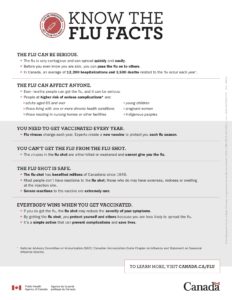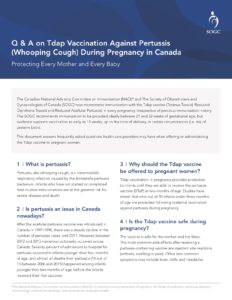Tests, Screens and Immunizations
Prenatal Screening (Down’s Syndrome, T18)
Prenatal Screening -NIPT
Link: NIPT Information
Breast Cancer
Link: Cancer Care Ontario
Smoking and Pregnancy
Link: Smoking

HIV Testing in Pregnancy
Link: HIV Testing in Pregnancy

Vaginal Yeast Infections
Vaginal Yeast Infections
What is a vaginal yeast infection?
Yeast is a fungus that normally lives in the vagina in small numbers. A vaginal yeast infection means that too many yeast cells are growing in the vagina. These infections are very common. Although they can bother you a lot, they are not usually serious. And treatment is simple.
What causes a vaginal yeast infection?
Most yeast infections are caused by a type of yeast called Candida albicans. A healthy vagina has many bacteria and a small number of yeast cells. The most common bacteria, Lactobacillus acidophilus, help keep other organisms-like the yeast-under control. When something happens to change the balance of these organisms, yeast can grow too much and cause symptoms. Taking antibiotics sometimes causes this imbalance. The high estrogen levels caused by pregnancy or hormone replacement therapy, stress or certain health problems, like diabetes or HIV infection can also cause it.
What are the symptoms?
A yeast infection causes itching, swelling or soreness in the vagina and sometimes causes pain or burning when you urinate or have sex. Some women also have a thick, clumpy, white discharge that has no odour and looks a little like cottage cheese.
How is a vaginal yeast infection diagnosed?
It’s easy to guess wrong about a vaginal infection. Call your midwife if you aren’t sure what you have or if this is the first time you have had these symptoms. A vaginal swab sent to the lab will confirm the infection.
How is it treated?
If you can recognize the symptoms, you can treat yourself at home with medicines you can buy without a prescription. You can use an antifungal cream, or a suppository that you put into your vagina at night. A 7 days treatment is the preferred length of treatment.
If your symptoms are mild, you may want to wait to see if they clear up on their own. Reduce sugar in your diet, and you may want to take lactobacillus acidophilus capsules orally. Some women have had success taking it vaginally for a week.
Can vaginal yeast infections be prevented?
If you practice good genital hygiene, you can help prevent infection.
– Keep your vaginal area clean. Use mild, unscented soap and water. Rinse well.
– After using the toilet, wipe from front to back to avoid spreading yeast or bacteria from your anus to the vagina or urinary tract.
– Wear underwear that helps keep your genital area dry and doesn’t hold in warmth and moisture. One good choice is cotton underwear.
– Avoid tight-fitting clothing, such as panty hose, and tight-fitting jeans. These may increase body heat and moisture in your genital area.
– Change out of a wet swimsuit right away. Wearing a wet swimsuit for many hours may keep your genital area warm and moist.
– Change pads often.
– Don’t douche or use feminine sprays, powders, or perfumes. These items can change the normal balance of organisms in your vagina.
– Transmission of yeast infection to your sexual partner is rare but can happen. Consider refraining from intercourse during the length of yeast infection. If your partner starts experiencing symptoms make sure to treat both of you at the same time.
– If you are close to your due date you will want to clear up any infections as soon as possible as yeast can be passed on to the baby at the time of birth.
Adapted from : Webmed. http://women.webmd.com/tc/vaginal-yeast-infections-what-increases-your-risk, May 2013
Cold or Flu?
Parvo Virus
Parvovirus B19 (Fifth’s Disease)
Parvovirus B19 infection is also called Parvo or Fifth’s Disease or Slapped cheek/slapped face Measles. Parvovirus is a common infection in children, especially 4 to 11 year olds. The infection is passed by saliva/hand-mouth contact, blood products from an infected person and rarely through the placenta to baby.
Children sick with Parvovirus often get fever, rash, and flu-like symptoms. Adults can also get Parvovirus, but it is much less likely that they will feel sick. People who have young children at home, or who work with young children on a daily basis, are more likely to be exposed to the virus. Most Parvovirus infections in pregnancy are from household contact, not workplace. Luckily 50-75% of adults have already had Parvovirus and cannot get the infection again (are immune). There are no cures or medications for Parvovirus infections.
To protect yourself from most infections, including Parvovirus, don’t share food/drinks and wash your hands often.
What are the symptoms?
Most adults who are infected with Parvovirus have no symptoms; some have only mild symptoms that get better on their own.
10 days after being exposed: common symptoms include fever, joint or muscle aches, headache, and flu-like symptoms (cough, sore throat, nausea and vomiting). Children, 1-4 days later (day 11-14), often get a rash on the face that looks like “slapped cheeks.” By the time symptoms are obvious or the rash is there, the person is usually no longer infectious.
Parvovirus is most contagious from day 4 to day 14 post exposure. Most people don’t know they have it during this time.
What are the concerns for my baby?
If you get Parvovirus infection during pregnancy, most babies are not harmed. Rarely, Parvovirus infection can damage your baby’s red blood cells and/or cause miscarriage especially before 20 weeks of pregnancy.
What do I do if I think I have been exposed?
As soon as possible, call your Midwife at the clinic. Exposure to Parvovirus is not an emergency. Your midwife will review your bloodwork and may order more bloodwork and an ultrasound looking for signs of Parvovirus infection.
Your blood work may show:
- That you are immune, and you and your baby are not at risk. No further follow up is needed.
- That you are are not immune, but also not infected. In this case, you should avoid contact with infected people, and your midwife will offer to repeat the test in 2-4 weeks to double check you were not infected.
- That you were infected with Parvovirus. This is the least likely result of the test. Your midwife will arrange for you to see an obstetrician/specialist, order an ultrasound and repeat bloodwork.
There is no current evidence that you need to leave your workplace if there is a case of Parvovirus detected to reduce your risk of infection. Your midwife will review with you your individual risks and workplace safety.
Reference:
Crane J., Mundle W., Boucoiran I., SOGC Clinical Practice Guideline No. 316 Parvovirus B19 Infection in Pregnancy. December 2014.
Pertussis (Whooping Cough) Vaccination in Pregnancy
Gestational Diabetes
Link: Gestational Diabetes

Hypertension (High Blood Pressure)
GBS (Group B Streptococcus)
Information on Vaccines
Where to get Bloodwork Drawn?
Midwives can draw bloodwork at the clinic if it matches the timing of your appointment, otherwise you can get your bloodwork drawn at Life labs. Link: Life Labs
Rh Negative Blood Type in Pregnancy
Rh Negative Blood Type in Pregnancy
What does Rh mean:
Everyone’s red blood cells do the same job in their bodies, but everyone’s red blood cells are a bit different. Your blood type is based on the antigens that are on the surface of your red blood cells. Whether you are A, B, AB or O depends on which of these common antigens you have. The Rh or D antigen is another very common antigen that most people have. People who do not have this antigen on their cells are said to be Rh negative. There are lots of other antigens out there too but they are much less common. If we come in contact with blood that has an antigen we don’t have then we can become sensitized. This means our immune system will produce antibodies to attack the new antigen.
How do I know if I am Rh Negative?
A simple blood test that we will perform in the first few visits will tell us your blood type, if you are Rh negative and if you have any antibodies.
What does Rh have to do with pregnancy?
Because most people are Rh positive there is a good chance that you or the father of your baby is Rh positive. When the mother is positive or if both parents are negative there is no effect on pregnancy. The only time Rh is important is when the mother is negative and the father is positive because the baby might be positive.
During pregnancy some of the baby’s blood can mix with the mother’s. If the baby is Rh positive then the Rh Negative mother may start to produce antibodies to the Rh antigen on the baby’s blood. These antibodies can damage Rh positive blood cells. Without medical care, these antibodies can cause the baby to be anemic, have brain damage or even die.
These antibodies sometimes develop in your first pregnancy, sometimes after the first child is born and sometimes early in a second or later pregnancy. Once you are sensitized, treatments are very limited.
If the father of the baby is Rh Negative, then the baby will also be negative and the mother will not develop the antibodies. However, treatment is still recommended just in case the father has a weak Rh positive which is missed by the laboratory but could mean the baby is positive.
How common are the problems?
If we do nothing the risk is about 16% that you would become sensitized during or after your first pregnancy. To look at it another way, 1.5% of Rh Negative women would become sensitized.
Can I prevent the problems if I am Rh negative?
There is a routine injection offered to Rh Negative women that can reduce the risk of becoming sensitized. This injection is given:
- at 28 weeks,
- after the birth (only if baby is confirmed to have Rh positive blood type)
- any time there is an increased chance your baby’s blood could enter your bloodstream (like after a car accident, miscarriage or amniocentisis)
What are the risks of Rh Immune Globulin or RhIG?
RhIG is a blood product. It contains the antibodies that have been collected from sensitized people. Donors used for the production of RhIG are screened carefully and the product is highly refined. There are no documented cases of any transmission of any significant viruses or other serious diseases (like HIV or hepatitis) from this type of blood product.
If you are already sensitized this will not help but there is no known risk.
What do I need to do?
You should consider the risks and benefits of RhIG and make a plan with your midwives. Most midwifery clients accept RhIG injections. Should you choose to decline RhIG, your midwife will have you sign a form indicating your informed choice.
You can be sure you get the medication that is available by making sure you page your midwife right away if you have any bleeding in pregnancy or if you experience any trauma to your belly (ie a car accident or a fall).
Cord Blood Banking









